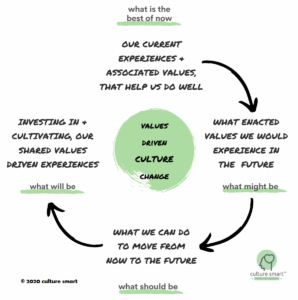To survive and thrive in group and team environments, we make sense of situations, our experiences, and our observations, applying meaning to understand what is valued.
Culture is our autopilot
“Most events are coated in cultural signals, and thus different symbols, structures, interactions, or words can trigger different expectancies. In this way, cultural norms shape how individuals construct and impose meaning on a situation.”
Depending on the frequency and recency of our experiences, the amygdala of our brain applies meaning to our emotional and behavioural responses. This ancient navigation system remembers repeated signals – what’s safe to do, what’s rewarded, and what’s punished – as norms of behaviours – the culture.
Cultural sense making can differ for individuals in the same situation, think about how family members can provide quite different and varied recollections of what happened, at the same family gathering.
People can also respond to the same situation in different ways, dependent on the context.
“In a professional setting surrounded by a large group of people, a subordinate would refrain from giving their opinion, but behind closed doors with three to four people, they would voice their opinion readily without being asked to speak. Neuropsychological studies provide evidence that culture influences our decisions and judgements.”
Resetting the autopilot
As our navigation system, the amygdala, “triggers responses and consequent decision-making processes to emotional stimuli,” to change how we behave and what we decide, largely relies on changing our emotional experiences. Quoting Sigal Barsade,
“one thing we now know after more than a quarter-century of research is that emotions are not noise — rather, they are data. They reveal not just how people feel, but also what they think and how they will behave.”
People commit to what they co-create, for organisations to change norms of behaviours and decision-making, requires engaging their employees in co-creating the desired emotional culture. Quoting Barsade,
“when we generally speak about organizational culture, we speak about a recognized and acknowledged set of cognitions viewed as important for the group to enact to meet its goals. However, emotional culture is the set of emotions necessary for a group to enact to meet its goals. The type of emotional culture an organization or a department predicts many important work outcomes, including objective performance outcomes like operating costs.”
Psychiatry and positive psychology provide evidence that appreciative inquiry is a successful way to create significant change, by studying, “the conditions and processes that contribute to the flourishing or optimal functioning of people, groups, and institutions”.
People move forward together in the direction of what is routinely studied and talked about. Problem solving the current culture, by investing inordinate amounts of the time and effort airing grievances and going over old ground, the associated negativity, blame, inaction, sense of failure and overwhelm, will increase impediments to cultural change. Quoting Tasha Eurich, an organizational psychologist,
““why” is a surprisingly ineffective self-awareness question .. when trying to understand our emotions or our behavior.. our judgments are seldom free from bias .. it invites unproductive negative thoughts. To increase productive self-insight and decrease unproductive rumination, we should ask what, not why. “What” questions help us stay objective, future-focused, and empowered to act on our new insights.”
Values-driven culture change

The modalities of appreciative inquiry that repeatedly asks ‘what’, and the emotional culture deck developed by Jeremy Dean (based on Barsade’s research), underpin my culture smart model for values driven culture change.
Facilitating the whole team / organisation in appreciative inquiry summits, co-creating values driven culture change.
- Identifying existing positive emotional experiences that help their team / organisation, do well, and how these indicate what their organisation / their team values. Agreeing which existing, positive value/s being enacted should continue, and reinforced as espoused value/s.
- Positive images and stories about the future, and what associated new positive emotional experiences would help their team / organisation, do well. Agreeing new espoused values, if enacted would create these experiences, at the same time identifying any existing, redundant espoused values.
- Agreeing what actions, resources, support, and obstacle removal, should move their team / organisation culture forward to the desired values-based one.
- Implementing and supporting change in ways that creates the social movements required to create cultural change.
————————————————————————————————————
EY’s 2019 corporate reporting research, found only 53% of Australian organisations report progress made, in embedding appropriate values across the organisation. Boards, Directors, Executives, and Leaders face growing obligations for changing culture, at a time many Australian organisations identify a lack of the critical knowledge required, to meet their obligations.


